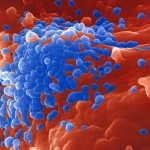Lien vers Pubmed [PMID] – 24691422
Br. J. Cancer 2014 May;110(10):2615-22
BACKGROUND: The revolution in cancer genomics shows that the dominant mutations are CG->TA transitions. The sources of these mutations are probably two host cell cytidine deaminases APOBEC3A and APOBEC3B. The former in particular can access nuclear DNA and monotonously introduce phenomenal numbers of C->T mutations in the signature 5’TpC context. These can be copied as G->A transitions in the 5’GpA context.
METHODS: DNA hypermutated by an APOBEC3 enzyme can be recovered by a technique called 3DPCR, which stands for differential DNA denaturation PCR. This method exploits the fact that APOBEC3-edited DNA is richer in A+T compared with the reference. We explore explicitly 3DPCR error using cloned DNA.
RESULTS: Here we show that the technique has a higher error rate compared with standard PCR and can generate DNA strands containing both C->T and G->A mutations in a 5’GpCpR context. Sequences with similar traits have been recovered from human tumour DNA using 3DPCR.
CONCLUSIONS: Differential DNA denaturation PCR cannot be used to identify fixed C->T transitions in cancer genomes. Presently, the overall mutation frequency is ∼10(4)-10(5) base substitutions per cancer genome, or 0.003-0.03 kb(-1). By contrast, the 3DPCR error rate is of the order of 4-20 kb(-1) owing to constant selection for AT DNA and PCR-mediated recombination. Accordingly, sequences recovered by 3DPCR harbouring mixed C->T and G->A mutations associated with the 5’GpC represent artefacts.

